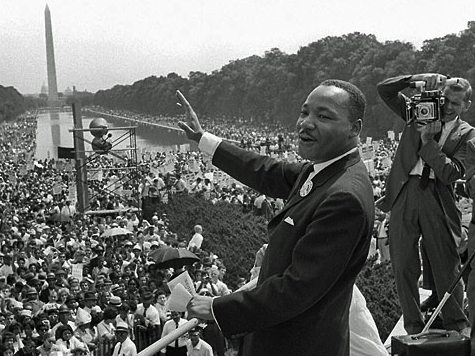President Barack Obama takes office today on Dr. Martin Luther King, Jr. Day for the second time as the first black president of the United States. If his election and re-election represent the fulfillment of Dr. King’s vision in a superficial sense, Obama’s goal of “fundamentally transforming” the United States into a government-centered social democracy represents one of the deeply challenging aspects of Dr. King’s legacy.
The great tragedy of civil rights movements–not just in the United States, but across the world–is that the end of discrimination has been closely tied to the start of state-directed redistribution. The result is that many of those who were formerly held down by the state believe that their success depends on state intervention. And the terrible irony is that the state’s role ensures that many who begin their freedom on the bottom rung, stay there.
In the U.S., the end of Jim Crow in the South was swiftly followed by the Great Society, which created perverse incentives for individuals not to work and families to split apart. In South Africa, affirmative action actually came before the end of apartheid, because the white minority government wanted to create a small black middle class as a buffer against political change. “Black economic empowerment” after apartheid enriched a few wealthy, politically-connected blacks while the many of the poorest became poorer.
And yet in both countries, the intended beneficiaries of these policies, who are in fact the victims of these policies, continue to elect politicians who promise to continue them. These voters do so partly out of deeply-internalized fear that they cannot compete on a level playing field, and partly out of suspicion that the old privileged castes, freed from the obligation to redistribute wealth and opportunity, would simply hoard them again.
There was a time in American history when liberation meant exactly that, when equality before the law was seen as sufficient–when leaders such as Frederick Douglass urged: “Do nothing with us! Your doing with us has already played the mischief with us.” That was in the immediate aftermath of the Civil War, when freedom of contract was prized as the antithesis to slavery, and self-reliance was the essence of citizenship and pride.
Within decades, freedom of contact would be attacked by the progressive movement, which mocked the idea that rich and poor, owner and employee could be expected to bargain on equal terms. In place of individual choice, progressives imagined the state, guided by experts making use of science and law to bring society nearer to perfection.
For a century since the famous Lochner v. New York case (1905), in which the Supreme Court struck down a law restricting working hours for bakers, law schools have trained future leaders of America to distrust freedom of contract, along with the idea of natural rights. The remedy was to banish the old constitutional doctrines and unleash the state–even if that meant, for many progressives, tolerating state-imposed discrimination.
The struggles of the civil rights era were largely fought among Democrats, with decisive support from Republicans for ending discrimination. But while those battles saw the end of state-enforced racism, they left untouched Democrats’ enthusiasm for state control of other kinds. The struggle for equal rights soon became a struggle for equal outcomes, redefining “rights” and leaving millions dependent on the government for generations.
The legacy we are left with is one in which to question something as neutral as the size or cost of government is considered by some to be racist. President Barack Obama embraces the linkage between civil rights and the increased power of government: it is, to him, part of “the long arc of history” of which Dr. Martin Luther King, Jr. spoke. But history does not always move “forward.” Our ideas of liberty and equality are less robust than they were more than a century ago. And they are, sadly, continuing to decline.
They are under particular threat now, when President Obama defines liberty as the ability to receive “free” goods from the state and rejects equality before the law in favor of “empathic” justice. That redistributionist obsession drives the divisive character of the Obama presidency, which is–ironically–the opposite of the spirit in which Dr. King led.

COMMENTS
Please let us know if you're having issues with commenting.